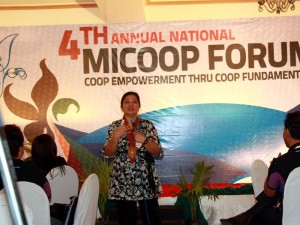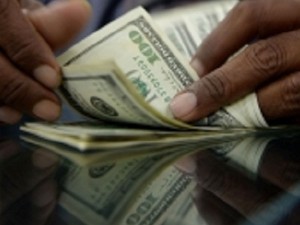
Former Cooperative Development Authority Chairperson Lecira “Bing” Juarez talks at the 4th Annual National Microfinance Innovations in Cooperatives Forum at the Sarabia Manor Hotel in Iloilo City, July 8, 2011. The Securities and Exchange Commission has released the draft rules for nongovernment microfinance organizations as part of broader efforts to support businesses of low-income households.
MANILA, Philippines—The Securities and Exchange Commission (SEC) has released the draft rules for nongovernment microfinance organizations as part of broader efforts to support businesses of low-income households.
The rules, posted on the website of the corporate regulator on Wednesday, are also seen to bolster consumer protection efforts and encourage these households to save.
The SEC is seeking comments for the guidelines, which also outline the requirements needed to establish a microfinance-NGO, sets how their funds should be allocated and details the needed documentation, as well as the penalties for violations.
It said covered microfinance organizations may grant loans from P2,000 to a maximum of P150,000 subject to “reasonable and conscionable imposable interest rates and charges.”
The minimum “seed capital” was also set at P150,000 although the SEC has the discretion to require a larger amount.
In terms of how funds will be allocated, the SEC said 70 percent should go to direct lending purposes. Moreover, its total investments in real estate, whether shares of publicly traded firms or “other real estate-based projects,” shall not exceed 25 percent of the organization’s net worth.
Majority of its members must also be Filipino citizens and foreigners will only be allowed to be a member of the said microfinance firm if the individual’s country “accords reciprocal rights to Filipinos.”
For those microfinance firms already operating and currently non-compliant with this rule, the SEC will give them one year to do so after the rules become effective.
Failure to comply means the microfinance organization will be suspended, after due notice and a hearing, for a period of 30 days.
These organizations, which are non-stock and non-profit entities, make use of alternative credit schemes and simplified loan application procedures. The goal is to grant loans to the “poor and low-income households for their microenterprises and small businesses, to enable them to raise their living standards.—Miguel R. Camus


